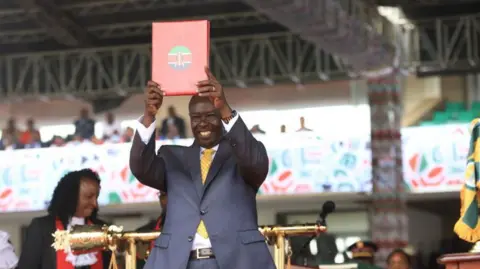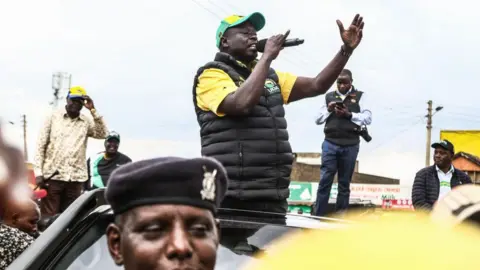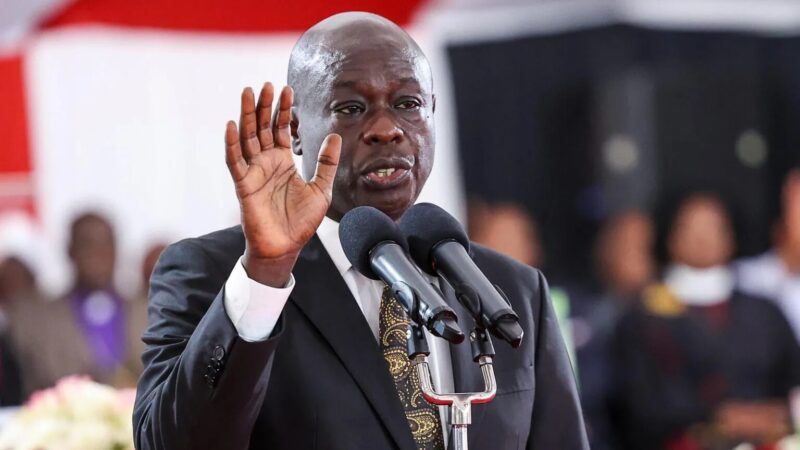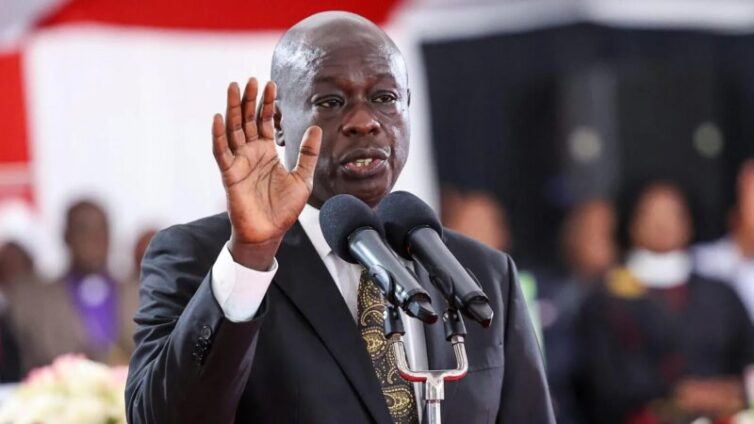Kenya's embattled Deputy President, Rigathi Gachagua, calls himself the “truthful man”, attributing his remarkable rise to the fact that he speaks truth to power.
But as he faces impeachment proceedings, he says these troubles are also a result of his outspoken nature.
Before he was elected MP in 2017, little was known about the man who would, in five short years, rise to become Kenya’s second-in-command.
Not many people outside Gachagua's central Kenya constituency had heard of him or his style of politics.
Gachagua captured the limelight in the run-up to the 2022 elections when he vehemently opposed President Uhuru Kenyatta’s choice of preferred successor.
Kenyatta was campaigning heavily for former Prime Minister Raila Odinga.
But Gachagua allied himself with William Ruto, Kenyatta’s then deputy, who was angling for the presidency that his boss did not want to bequeath to him.
At political rallies and in media circles, Gachagua railed against Kenyatta, often in words that other politicians would find cringeworthy.
“Don’t kill me the way your father killed JM Kariuki,” he said at a rally in July 2022, referring to an MP who was killed in 1975 during the administration of Jomo Kenyatta, the nation's first president and the father of Uhuru Kenyatta.
To this day, no one has been found guilty of Kariuki's death.
Before he became Kenya's deputy president, police raided Gachagua's home and arrested him in relation to a corruption and money-laundering case. The charges were dropped after he and Ruto took power following the 2022 election.
He had helped Ruto win by marshalling support in Mount Kenya - the biggest voting bloc in the country. Both Gachagua and Kenyatta come from there. Kenyatta had tried to rally Mount Kenya's voters to throw their weight behind Odinga, but he failed.

Long before Kenyatta became president in 2013, Gachagua had worked closely with him, including as his personal assistant for five years.
But after teaming up with Ruto, Gachagua went from being Kenyatta's “confidant” to one of his harshest critics.
However, since falling out with his current boss, Gachagua has apologised to Kenyatta, saying it was “foolish” of him to have “fought my own brother".
This humility is in sharp contrast to his rhetoric as Ruto's running-mate - analyst Javas Bigamo had even described Gachagua as a “feared political bulldog that Ruto needed to be able to counter President Kenyatta in the central region”.
Gachagua was praised as an excellent mobiliser, who had the ear of ordinary people on the ground.
Yet he was probably not the person many expected to take the deputy position, given that Gachagua had only being a politician for five years and was up against more seasoned candidates.
Ruto explained he had chosen Gachagua because "he is one of those leaders who are passionate about ordinary people".
Politics expert Bobby Mkangi previously told the BBC that Gachagua’s ability to negotiate his way to the top “considering other names that were fronted and were known nationally" was "quite something”.
But just two years after ascending to power, that ability seems to have fizzled out – leaving Gachagua butting heads with the president and in a position where many legislators are pushing for his removal.
He stands accused of corruption, money-laundering, gross misconduct, insubordination and bullying of public officers and six other acts of wrongdoing.
As the motion was being tabled in parliament on Tuesday, the MP introducing the motion, Mwengi Mutuse, said that 291 out of 349 MPs had signed the document pushing for Gachagua's removal.
The signatures of two-thirds - or 233 - of all MPs are required to impeach him.
Mkangi now says the deputy president has been “unable to consolidate the support of his base and the politicians around him”.

Gachagua has always been accused of being brash and aggressive – it was one of the reasons some argued against his selection to the running mate position prior to the 2022 election. But in recent months, this criticism has increased.
He denies this assessment of his character, along with assertions that he alienates his fellow politicians.
He says all he does is “speak the truth”, which he insists has made him unpopular within certain political factions.
“I will not compromise my principles,” he said over the weekend as calls for his impeachment came to a crescendo.
Gachagua has often identified himself as a child of the Mau Mau freedom fighters, who battled British colonial rule.
He was born in 1965 to parents who he has said were well-known for their involvement in the struggle for freedom. His father built and serviced guns and his mother was a courier of ammunition and food for the fighters, Gachagua said.
His lineage has painted him as a champion of people in central Kenya, many of whom are descendants of independence struggle icons, but continue to fight for economic freedom.
A popular catchphrase associated with the deputy president is “don’t touch the mountain”, a reference to his support base in the Mount Kenya region.
However, he has also been accused of promoting tribalism rather than being a unifying figure.

But Gachagua has defended himself, insisting that speaking for the central Kenya region is not the same as antagonising other communities.
Before joining politics, Gachagua had had a long career.
After completing university, he began working as a public administrator in government, and as a district officer in different locations across the country.
The district administrators of that time, during Daniel Arap Moi’s presidency, were known for their high-handedness. It is an accusation that has stuck with him, including in present circumstances.
He worked as Kenyatta's personal assistant between 2001 and 2006 – at a time when Kenyatta was a minister, presidential candidate and later the leader of the opposition.
Gachagua is a wealthy politician, having built a fortune in business over the years. He is married to a pastor, Dorcas, and they have two adult sons.
In 2017, he vied for the Mathira constituency seat, winning the position that had earlier been held by his elder brother, Nderitu Gachagua.
It was at this time that Gachagua's fiery character and political abilities started attracting attention.
Yet his public utterances, before and since he became deputy president, have at times been seen as blunders or straight-up disgraceful comments.
He said last year that government was like a shareholding company, with those who voted for the current administration being more deserving of government appointments and contracts.
Senator Danson Mungatana last week said Gachagua’s words have “marginalised sections of Kenyans, created and continue to heighten ethnic tensions”.
Gachagua has often defended himself, but recently he acknowledged that in the end, it may be the very same thing that catapulted him to the top that will lead to his downfall: his way with words.
Latest Stories
-
Cedi stability can’t be attributed to GoldBod – Kabiru Tiah
5 minutes -
Jennifer Lopez sued for posting photos of herself
10 minutes -
The appreciation of the Ghana cedi: Strategic marketing responses to price reduction pressures
31 minutes -
Sedem Segbedzi-Semekor crowned ‘Face of Lisben 2025’
39 minutes -
YEA donates bags of maize to some SHSs in Bono Region
45 minutes -
BBC uncovers child sex abuse in South Africa’s illegal mines
46 minutes -
Combined Kumasi Central Market Unions beseech KMA to recompense promised eviction package
1 hour -
Keren Tetteh: Transforming Lives through Communication Empowerment
1 hour -
Resign honourably! UTAG-UG to Auditor-General over “unethical” audit report
1 hour -
St. Cyprian’s Anglican hosts corporate Kumasi on Rogation Sunday
1 hour -
FDA struggles to enforce recall as banned alcoholic drink remains on the market
2 hours -
GPHA reaffirms commitment to enhancing ease of doing business at the ports — Director-General assures
2 hours -
Majority of Ghanaians support Chief Justice suspension – Global Info Analytics survey
2 hours -
Be cautious in attempts to rescue accident victims – Ambulance Service advises public
2 hours -
Hearse operators abusing sirens should be arrested and prosecuted – Ambulance Service
2 hours

